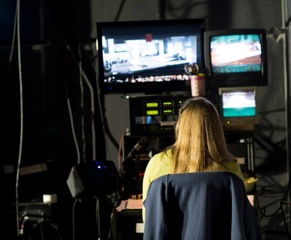
“Ladies and Gentlemen, this is your half-hour call.
30 minutes please”
The half-hour call, known as the half, is 35 minutes before curtain up (in the UK. I believe it is different on Broadway.) The next thirty minutes are a busy and thoughtful time on any show.
Everyone on the show is in the theatre, signed in at the Stage Door, at least by the half. Many are in much earlier. Performers must warm up, make-up, costume-up and prepare. The lighting rig and sound system must be checked. Set and props have to be in the right place and the costumes ready for the performers. In some theatres, these tasks are done earlier in the day so that there is time to fix anything which goes wrong; lights break; props need mending and costumes may need cleaning and running repairs. The stage needs to be swept and for dance and ballet performances, it must be mopped. Contemporary dances are often barefoot and ballet dancers use rosin on their pointe shoes which makes the stage sticky.

The DSM makes all the calls. S/he will run the show from the prompt corner and needs to be in contact with the lighting board and sound operators, the fly floor and ASMs. (Assistant Stage managers.) The cans – an old-fashioned term for headset communications – will be flashed out during the half.
Aa well as the backstage calls, the DSM will make announcements to the audience Front of House to make sure that the audience is seated in plenty of time for the show to begin ON TIME. This is really important and we take it for granted, but there are a lot of elements to bring together. to ensure that curtain-up is not delayed.
If the Half is 35 minutes before curtain up, then it stands to reason that the Quarter is 20 minutes before kick-off.
“Ladies and Gentlemen, this is your fifteen-minute call.
15 minutes please”
Backstage, performers are finalising their make-up and costumes. Voices of actors and singers are warming up and dancers are stretching. Stage management is making final checks; the props table is checked again. The legs and wings are checked for obstruction and loose cables and the fly-floor operators will check that the weights are balanced. The lighting board operator is checking the pre-sets on the board, and the sound operator is doing a pre-fade listen to check the performers’ mics are working. The dressers are checking the costume rails and the performers are focussing inwards and breathing deeply.
Nerves are jangling in all departments and the orchestra is tuning up.
“Ladies and Gentlemen, please take your seats in the auditorium. This evening’s performance will begin shortly”
Ten minutes to curtain up and we get the five-minute call – the Five. The whole company of performers, musicians, stage management, technical teams, wardrobe and make-up, should be ready by now. Front of House will be ushering the audience to their seats and the bar staff taking orders for interval drinks.
And finally, the moment we have been preparing for; the Beginners Call, sometimes referred to as the Onstage call, five minutes before curtain up.
In Divas, Dogs and Dreamers, there are many times when Sophie must get Callandra, the Diva, onto the stage ready to perform.
‘‘Ladies and Gentlemen, this is your on-stage call.
Ms Jewell to the stage, please.
Stand by stage management and technical staff.’
‘Break a leg,’ Sophie said, and Callandra returned her smile.
Callandra took her place.
The stage went black. There was total silence.
The Front of House Manager will let the DSM know when the audience is seated, and in many theatres, latecomers will only be admitted when there is a suitable point in the show, to minimise disturbance.
‘We have clearance. Quiet please,’ says the DSM and all unnecessary chatter on the cans about where we are going to eat after the show, or who was seen leaving with whom last night, now stops.
The DSM is driving the show.

- Stand by smoke, says the DSM. Standing by is the reply.
- Stand by tabs – standing by
- Stand by Sound Q1 – standing by
- Stand by LX Q1 – standing by
- Stand by Flys Q1 – standing by
Sophie was aware of Alex beside her in the wings. There was just enough light from prompt corner for the deputy stage manager to call the cues and the emergency exit lights were shielded from the stage.
‘Here goes,’ Alex said, and Sophie could feel the excitement radiating from him. It was contagious.
- ‘Smoke … GO.
- Tabs … GO
- LX Q1 GO
- Flys Q1. GO
- Stand by LX Q2 – Standing by
- LX Q2 GO’
The music was quiet and moody and Sophie heard the swish of the curtain rising, the stage still in blackness. Then they heard the gasps from the audience as a cloth of stars revealed a floor of white cloud and a single spotlight from above picked out Serafina, sheathed in a silver gown. There was a burst of applause as Serafina’s feathered wings unfolded, glowing white in the shimmering stage light. As the music soared her head lifted and when her voice erupted to join the soaring strings, the effect was breath taking.
The show is underway.
The chatter on the cans is now about reminders, preparing for a scene; a changeover; a quick lighting change; backstage calls to performers; cues are called and answered and the cue lights flash red and green on the prompt desk. The scurrying around backstage continues. But the nerves ease and a focussed concentration takes its place. Joy begins to seep into the space as momentum builds.
‘Yesssss!’ Alex said. He gave the stage manager a high five and left via the pass door to the front of house.
Extract from Divas, Dogs and Dreamers Chapter 22

This gave me goosebumps! I miss going to the theatre. It must be incredible to work behind the scenes. A great insight. Thank you.
LikeLiked by 1 person